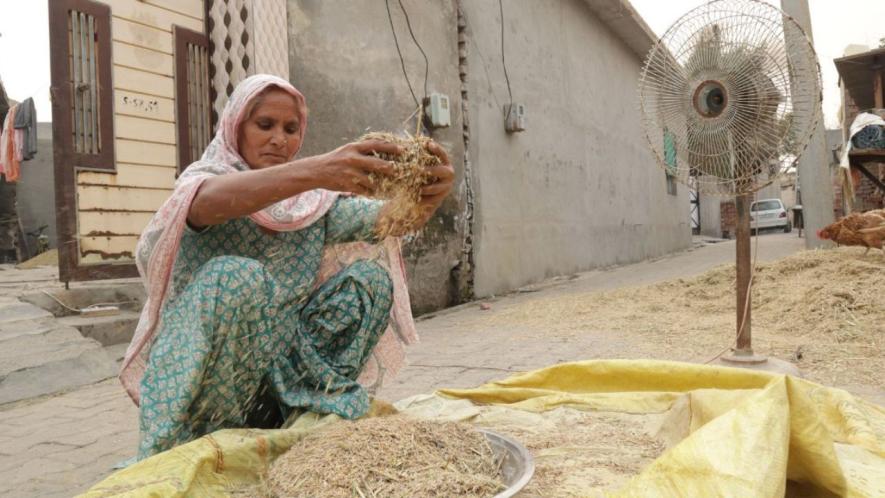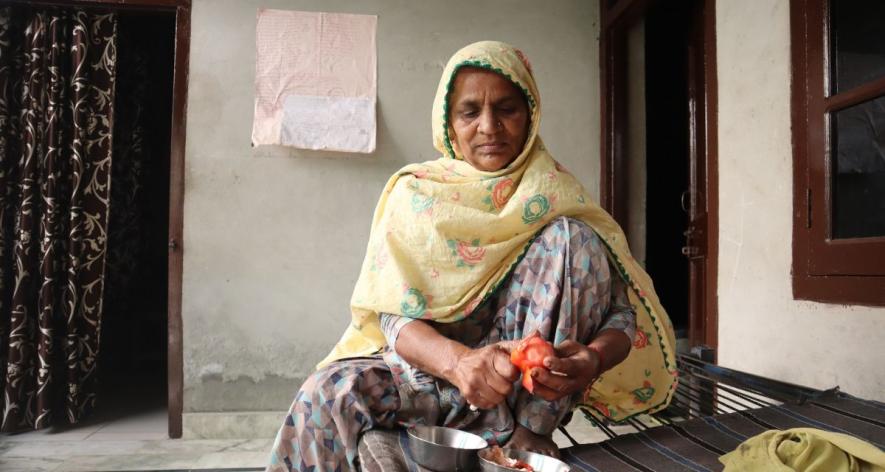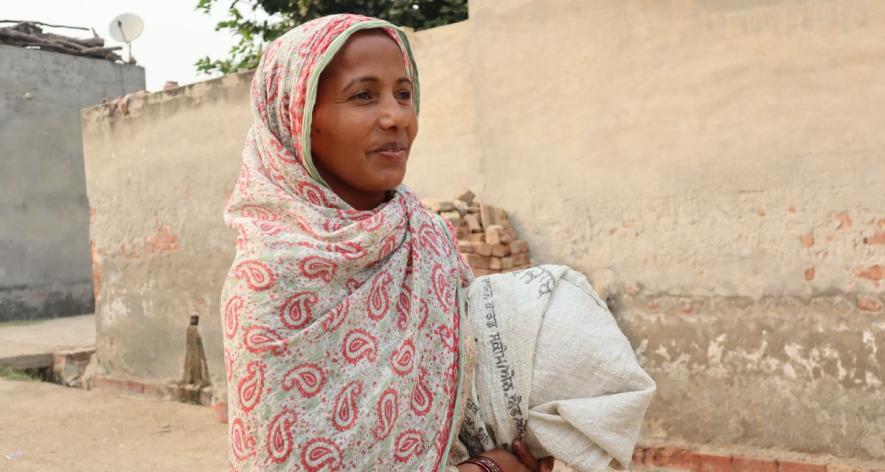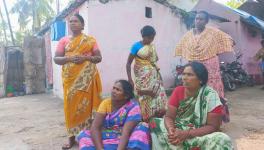Punjab: Why Dalit Women Farmers Are Giving up on Organic Cultivation

Karamjeet Kaur removing the husk from paddy (Photo - Sanskriti Talwar, 101Reporters)
Sangrur, Punjab: When a group of 10 landless women from Changali Wala village in Punjab’s Sangrur district began organic farming on one-and-a-half acres of village common land (shamlat land) reserved for Scheduled Caste (SC) community five years ago, they were motivated not only by the desire to grow chemical-free food but also by the hope of earning a better income.
Pooling resources from within the family, these women, nine of whom belonged to Dalit community of Ramdasia Sikh, leased the reserved land for Rs 55,000, thus launching their organic farming journey. The 10th member belonged to the same village, but from the Jat Sikh community.
Under Punjab’s Village Common Lands (Regulation) Act, 1961, one-third of the cultivable land in each village is designated for SC community. The local administration holds land auctions every April and May.
The women grew paddy, flowers and vegetables, which they sold from a small tin-roof roadside shop. “People were happy to buy our vegetables at double the market price because they were organic,” recalled Manjeet Kaur (52). Their crops included cauliflower, carrots, bottle gourd, tomatoes, potatoes, mushrooms, leafy greens, and more. “Every day felt like a mela [fair] over there,” added Sinder Kaur (45).

Manjeet Kaur preparing to cook (Photo - Sanskriti Talwar, 101Reporters)
“We never realised how quickly the first year passed. Those 12 months felt like only 12 days,” added Jaspal Kaur (50), explaining how they would finish their daily household chores by 8 am to spend time till evening in the field.
The women managed every task by themselves — from preparing soil beds with hay or mustard stalks to making organic pesticide by boiling black plum, lemon and guava leaves with fruit peels and chillies. They also used sour buttermilk and neem leaf spray to deter pests.
Harbans Kaur, in her 40s, explained why they chose organic methods: “If a spray can kill a pest, just imagine the harm it could do to us when we consume it.”
The women all noted how much better the vegetables tasted than those from the market.
In their first year, they earned a profit of around Rs 60,000. However, by the second year, the COVID-19 lockdown (March 2020) reduced customer flow. Also, the lease amount on the common land went up to Rs 78,000, outpacing their earnings.
To sustain farming, the women had to reinvest their profits and draw from family incomes, straining the already limited resources. This financial burden led four members to leave the collective.
By the third year, as the lease climbed to Rs 84,000, two more women decided to step away. With the lease holding steady over Rs 80,000 the following year, the remaining women finally had to abandon their ambition.
“The high lease rate left us vulnerable,” noted Sinder.
“A lot of hard work goes into organic farming. Every crop needs constant care. Yet, by the end, we had almost no savings,” said Harbans.

Harbans Kaur on her way to work in the fields (Photo - Sanskriti Talwar, 101Reporters)
The women felt that they did not get enough support from the then village panchayat and sarpanch, who belong to the same community and could have stabilised lease rates.
However, Harkeerat Singh, belonging to the dominant Jat Sikh community and elected as sarpanch in October, explained, “The lease rate is not within the village head’s control. It is determined by the auction process, where others bid higher to secure the land.”
He acknowledged that lease rates are often inflated by dummy candidates representing dominant-caste landlords. This practice has long disadvantaged Dalits.
This year, the reserved land for the Scheduled Castes in Changali Wala was leased at Rs 55,000 — the same rate it was leased to the group of women five years ago, according to the local village body.
Mukesh Malaudh, president, Zameen Prapti Sangharsh Committee — an organisation advocating for land rights for Dalits — explained that under the Punjab Village Common Lands (Regulation) Act, 1961, panchayats and block district officials have the authority to lease the common land to Scheduled Caste people for up to three years, “with an allowable annual increase of 10% on the established rate in subsequent years”.
According to the committee, massive protests by Dalit collectives in Sangrur district have led to reduced lease rates for village common land, averaging Rs 20,000–22,000 per acre compared to Rs 65,000–70,000 for unreserved land. Unlike in the past, SC community has begun cultivating their rightful land, challenging past practices of dummy candidates.
However, leasing land often comes with social barriers, especially for the Dalit women.
“Within the village, there would be a sense of unease that women are now coming forward and farming on their own,” said Malaudh. “It is not that the villagers have a problem with Dalit women working in the fields — it is that these women are not labouring in landowners’ fields for meagre wages,” he added.
The women of Changali Wala did face the taunts. “Some village men passing by would comment, ‘Now women will show how to do farming?’” recalled Sinder. “But women used to work in the fields all the time, and work was also available. As machines took over, there was less work left for us,” she noted.
Approximately 75% of rural women workers in India are engaged in agriculture, yet only 12% of them own the land they cultivate, according to the Agricultural Census 2015-16. In Punjab, the situation is even starker, with only 1.5% of women registered as landowners. Only 3.5% of private farmland belongs to Dalits who make up 32% of the state’s population.
“In India, including in Punjab, very few women are officially recognised as farmers. Despite their significant contributions to agriculture, they are categorised as cultivators or non-cultivators and, without land ownership in their name, are excluded from being officially considered farmers,” Dr Navsharan Kaur, an independent scholar and activist based in Punjab, told 101Reporters.
This lack of recognition denies them access to crucial government support, such as the Kisan Credit Card scheme, crop insurance, and other targeted subsidies, she added.
A pressing concern is the urgent need to move away from the Green Revolution model and adopt sustainable farming practices (Evergreen Revolution) in Punjab. However, Navsharan noted that this transition requires strong government backing to ensure its success.
For landless Dalits who want to cultivate land, Navsharan emphasised that the prevalent system of annual land leasing exacerbated vulnerabilities, offering no opportunity for long-term investment or land improvements, both of which are essential for sustainable agriculture.
Punjab has a history of land rights movements, one of the most prominent being the Muzara Movement (1930–1953). Led by tenant farmers, it sought to abolish biswedari — a system under which landlords controlled vast tracts of land in the princely state of Patiala and the East Punjab States’ Union.
However, Dalits were excluded from this movement, leaving their land rights struggles unaddressed within the broader push for land reform.
It was not until the Punjab Village Common Lands Act was enacted in 1961, with rules established in 1964, that provisions were made to reserve portions of village common lands for SC community, offering them a foothold in agricultural land ownership.
However, the provision has struggled to achieve its intended impact. Persistent social and systemic barriers, such as high lease rates, proxy bidding by dominant-caste landlords and a lack of enforcement, have limited the ability of Dalits to fully benefit from the reserved land. Thus, the struggle to assert land rights among Dalits persists, driven by their continued exclusion from equitable access to land.
The women of Changali Wala are a part of a long tradition of Dalits who have been fighting for their land rights.
In Balad Kalan village in Sangrur, the epicentre of an earlier Dalit land agitation, the fight for land was met with severe resistance, including brutal lathi charges in 2014 and 2016. “The committee members in the village, disheartened by the violence, considered giving up. They began to question whether they needed the land as much as they had thought,” Malaudh recalled.
When the men decided against attending the land auction, the women of the village stepped up. “Despite police warnings and immense pressure, they said, ‘We will fight for the land.’ The women were fighting not only for the land but for the respect that comes with working on their own land,” he added, pointing how otherwise they were exploited, abused and harassed while working in the fields of Jat Sikh landowners.
This sentiment of owning land resonated with the women of Changali Wala. “We felt it was our own land, truly belonging to us along with the crops,” said Harbans. The women kept it so well that, as Jaspal put it, “it stood out among the other fields.”
This year, the Punjab government released a draft of its long-awaited agricultural policy, which included recommendations for women in agriculture and farm workers. However, Dr Navsharan criticised the policy, stating that it erased women’s active role in farming and instead reduced their contributions to occupations like stitching and embroidery — dead-end skills that offer little to improve livelihoods. “Do we need a policy for that,” she asked.
Punjab Khet Mazdoor Union has been demanding leasing of the reserved land for at least three years across Punjab. Lachhman Singh Sewewala, the union general secretary, stated that the policy failed to tackle critical issues, such as curbing the practice of dominant-caste landlords acquiring reserved land by using Dalits as proxies.
“Additionally, it completely overlooks the need to revisit Punjab’s Land Ceiling Reforms Act, 1972, which allows a family unit [husband, wife and children] to own up to 17.5 acres of fertile, irrigated land or 32 acres of barren, non-irrigated land. Reforming this Act to distribute land among the landless could have offered at least some relief and a pathway forward,” Lachhman added.
Whether the women of Changali Wala will return to organic farming remains uncertain. Age has become a factor as well.
“Now our bodies ache, especially the knees,” said Manjeet.
As they look to the future, these women hope that policy changes might provide another opportunity to farm collectively.
Meanwhile, Jaspal and her family dream of owning their own land someday, hoping that, once her three children are employed and her husband retires as a tailor, they might afford to make this dream a reality.
This story was produced as a part of NCNF Media Fellowship on Agroecology.
Sanskriti Talwar is a Punjab-based freelance journalist and a member of 101Reporters, a pan-India network of grassroots reporters.)
Get the latest reports & analysis with people's perspective on Protests, movements & deep analytical videos, discussions of the current affairs in your Telegram app. Subscribe to NewsClick's Telegram channel & get Real-Time updates on stories, as they get published on our website.
























